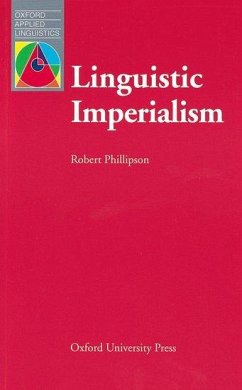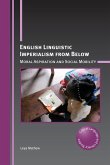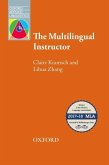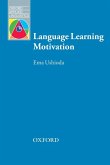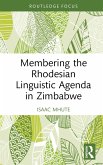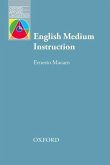Robert Phillipson
Linguistic Imperialism
Robert Phillipson
Linguistic Imperialism
- Broschiertes Buch
- Merkliste
- Auf die Merkliste
- Bewerten Bewerten
- Teilen
- Produkt teilen
- Produkterinnerung
- Produkterinnerung
This book explores the contemporary phenomenon of English as an international language, and sets out to analyse how and why the language has become so dominant. It looks at the spread of English historically, at the role it plays in Third World countries, and at the ideologies transmitted through the English language.
Andere Kunden interessierten sich auch für
![Babel Babel]() R.F. KuangBabel16,99 €
R.F. KuangBabel16,99 €![English Linguistic Imperialism from Below English Linguistic Imperialism from Below]() Leya MathewEnglish Linguistic Imperialism from Below41,99 €
Leya MathewEnglish Linguistic Imperialism from Below41,99 €![The Multilingual Instructor The Multilingual Instructor]() Claire KramschThe Multilingual Instructor84,99 €
Claire KramschThe Multilingual Instructor84,99 €![Oxford Applied Linguistics: Language Learning Motivation Oxford Applied Linguistics: Language Learning Motivation]() Ema UshiodaOxford Applied Linguistics: Language Learning Motivation62,99 €
Ema UshiodaOxford Applied Linguistics: Language Learning Motivation62,99 €![Membering the Rhodesian Linguistic Agenda in Zimbabwe Membering the Rhodesian Linguistic Agenda in Zimbabwe]() Isaac Mhute (Zimbabwe Midlands State University)Membering the Rhodesian Linguistic Agenda in Zimbabwe69,99 €
Isaac Mhute (Zimbabwe Midlands State University)Membering the Rhodesian Linguistic Agenda in Zimbabwe69,99 €![English Linguistic Imperialism from Below English Linguistic Imperialism from Below]() Leya MathewEnglish Linguistic Imperialism from Below128,99 €
Leya MathewEnglish Linguistic Imperialism from Below128,99 €![English Medium Instruction English Medium Instruction]() Ernesto MacaroEnglish Medium Instruction84,99 €
Ernesto MacaroEnglish Medium Instruction84,99 €-
-
-
This book explores the contemporary phenomenon of English as an international language, and sets out to analyse how and why the language has become so dominant. It looks at the spread of English historically, at the role it plays in Third World countries, and at the ideologies transmitted through the English language.
Hinweis: Dieser Artikel kann nur an eine deutsche Lieferadresse ausgeliefert werden.
Hinweis: Dieser Artikel kann nur an eine deutsche Lieferadresse ausgeliefert werden.
Produktdetails
- Produktdetails
- Oxford Applied Linguistics
- Verlag: Oxford University Press
- Seitenzahl: 376
- Erscheinungstermin: 9. April 1992
- Englisch
- Abmessung: 217mm x 139mm x 25mm
- Gewicht: 458g
- ISBN-13: 9780194371469
- ISBN-10: 0194371468
- Artikelnr.: 21257446
- Herstellerkennzeichnung
- Libri GmbH
- Europaallee 1
- 36244 Bad Hersfeld
- gpsr@libri.de
- Oxford Applied Linguistics
- Verlag: Oxford University Press
- Seitenzahl: 376
- Erscheinungstermin: 9. April 1992
- Englisch
- Abmessung: 217mm x 139mm x 25mm
- Gewicht: 458g
- ISBN-13: 9780194371469
- ISBN-10: 0194371468
- Artikelnr.: 21257446
- Herstellerkennzeichnung
- Libri GmbH
- Europaallee 1
- 36244 Bad Hersfeld
- gpsr@libri.de
Acknowledgements
1: ELT: Taking stock of a world commodity
The aims of this book
English for all?
Professional and ethical aspects of ELT 'aid'
Notes
2: English, the dominant language
English in core English-speaking countries
English in periphery-English countries
Language promotion
Opposition to the dominance of English
Notes
3: Linguistic imperialism: theoretical foundations
A cautionary word on terminology
A working definition of English linguistic imperialism
Linguistic imperialism and linguicism
Cultural imperialism in science, the media, and education
The State, hegemony, and ELT
Notes
4: Earlier work relevant to linguistic imperialism
Language spread
The sociology of language
Language planning
Theoretical models of language teaching and learning
Linguistic human rights
Two approaches, Wardhaugh and Calvet
Notes
5: The colonial linguistic inheritance
Their masters' language
Colonial educational language policy and practice
The importance of English as a colonial inheritance
Notes
6: British and American promotion of English
The origins and structure of the British Council
The British strategy for expanding ELT
American promotion of English
Anglo-American collaboration
Notes
7: Creating a profession: the structure and tenets of ELT
Creating a British academic base for ELT
ELT and educational language planning for under-developed countries
Tenet one: English is best taught monolingually
Tenet two: the ideal teacher of English is a native speaker
Tenet three: the earlier English is taught, the better the results
Tenet four: the more English is taught, the better the results
Tenet five: if other languages are used much, standards of English will drop
Conclusions: the legacy of Makerere
Notes
8: English language teaching in action
ELT research
ELT in 'aid' to education
- The overall context of ELT 'aid'
- EFL, ESL or ... ?
- Principles for the analysis of ELT in 'aid'
- Postulate 1: political disconnection
- Postulate 2: narrowly technical training
- English for special and new purposes
Notes
9: Arguments in linguistic imperialist discourse
Types of argument and types of power
English-intrinsic arguments
English-extrinsic arguments
English-functional arguments
The means used to exert linguistic power
Arguments in language planning for Namibia
Notes
10: Linguistic imperialism and ELT
ELT: master-minded?
On the force of the evidence
Studying ELT and imperialism
Notes
Bibliography
Index
1: ELT: Taking stock of a world commodity
The aims of this book
English for all?
Professional and ethical aspects of ELT 'aid'
Notes
2: English, the dominant language
English in core English-speaking countries
English in periphery-English countries
Language promotion
Opposition to the dominance of English
Notes
3: Linguistic imperialism: theoretical foundations
A cautionary word on terminology
A working definition of English linguistic imperialism
Linguistic imperialism and linguicism
Cultural imperialism in science, the media, and education
The State, hegemony, and ELT
Notes
4: Earlier work relevant to linguistic imperialism
Language spread
The sociology of language
Language planning
Theoretical models of language teaching and learning
Linguistic human rights
Two approaches, Wardhaugh and Calvet
Notes
5: The colonial linguistic inheritance
Their masters' language
Colonial educational language policy and practice
The importance of English as a colonial inheritance
Notes
6: British and American promotion of English
The origins and structure of the British Council
The British strategy for expanding ELT
American promotion of English
Anglo-American collaboration
Notes
7: Creating a profession: the structure and tenets of ELT
Creating a British academic base for ELT
ELT and educational language planning for under-developed countries
Tenet one: English is best taught monolingually
Tenet two: the ideal teacher of English is a native speaker
Tenet three: the earlier English is taught, the better the results
Tenet four: the more English is taught, the better the results
Tenet five: if other languages are used much, standards of English will drop
Conclusions: the legacy of Makerere
Notes
8: English language teaching in action
ELT research
ELT in 'aid' to education
- The overall context of ELT 'aid'
- EFL, ESL or ... ?
- Principles for the analysis of ELT in 'aid'
- Postulate 1: political disconnection
- Postulate 2: narrowly technical training
- English for special and new purposes
Notes
9: Arguments in linguistic imperialist discourse
Types of argument and types of power
English-intrinsic arguments
English-extrinsic arguments
English-functional arguments
The means used to exert linguistic power
Arguments in language planning for Namibia
Notes
10: Linguistic imperialism and ELT
ELT: master-minded?
On the force of the evidence
Studying ELT and imperialism
Notes
Bibliography
Index
Acknowledgements
1: ELT: Taking stock of a world commodity
The aims of this book
English for all?
Professional and ethical aspects of ELT 'aid'
Notes
2: English, the dominant language
English in core English-speaking countries
English in periphery-English countries
Language promotion
Opposition to the dominance of English
Notes
3: Linguistic imperialism: theoretical foundations
A cautionary word on terminology
A working definition of English linguistic imperialism
Linguistic imperialism and linguicism
Cultural imperialism in science, the media, and education
The State, hegemony, and ELT
Notes
4: Earlier work relevant to linguistic imperialism
Language spread
The sociology of language
Language planning
Theoretical models of language teaching and learning
Linguistic human rights
Two approaches, Wardhaugh and Calvet
Notes
5: The colonial linguistic inheritance
Their masters' language
Colonial educational language policy and practice
The importance of English as a colonial inheritance
Notes
6: British and American promotion of English
The origins and structure of the British Council
The British strategy for expanding ELT
American promotion of English
Anglo-American collaboration
Notes
7: Creating a profession: the structure and tenets of ELT
Creating a British academic base for ELT
ELT and educational language planning for under-developed countries
Tenet one: English is best taught monolingually
Tenet two: the ideal teacher of English is a native speaker
Tenet three: the earlier English is taught, the better the results
Tenet four: the more English is taught, the better the results
Tenet five: if other languages are used much, standards of English will drop
Conclusions: the legacy of Makerere
Notes
8: English language teaching in action
ELT research
ELT in 'aid' to education
- The overall context of ELT 'aid'
- EFL, ESL or ... ?
- Principles for the analysis of ELT in 'aid'
- Postulate 1: political disconnection
- Postulate 2: narrowly technical training
- English for special and new purposes
Notes
9: Arguments in linguistic imperialist discourse
Types of argument and types of power
English-intrinsic arguments
English-extrinsic arguments
English-functional arguments
The means used to exert linguistic power
Arguments in language planning for Namibia
Notes
10: Linguistic imperialism and ELT
ELT: master-minded?
On the force of the evidence
Studying ELT and imperialism
Notes
Bibliography
Index
1: ELT: Taking stock of a world commodity
The aims of this book
English for all?
Professional and ethical aspects of ELT 'aid'
Notes
2: English, the dominant language
English in core English-speaking countries
English in periphery-English countries
Language promotion
Opposition to the dominance of English
Notes
3: Linguistic imperialism: theoretical foundations
A cautionary word on terminology
A working definition of English linguistic imperialism
Linguistic imperialism and linguicism
Cultural imperialism in science, the media, and education
The State, hegemony, and ELT
Notes
4: Earlier work relevant to linguistic imperialism
Language spread
The sociology of language
Language planning
Theoretical models of language teaching and learning
Linguistic human rights
Two approaches, Wardhaugh and Calvet
Notes
5: The colonial linguistic inheritance
Their masters' language
Colonial educational language policy and practice
The importance of English as a colonial inheritance
Notes
6: British and American promotion of English
The origins and structure of the British Council
The British strategy for expanding ELT
American promotion of English
Anglo-American collaboration
Notes
7: Creating a profession: the structure and tenets of ELT
Creating a British academic base for ELT
ELT and educational language planning for under-developed countries
Tenet one: English is best taught monolingually
Tenet two: the ideal teacher of English is a native speaker
Tenet three: the earlier English is taught, the better the results
Tenet four: the more English is taught, the better the results
Tenet five: if other languages are used much, standards of English will drop
Conclusions: the legacy of Makerere
Notes
8: English language teaching in action
ELT research
ELT in 'aid' to education
- The overall context of ELT 'aid'
- EFL, ESL or ... ?
- Principles for the analysis of ELT in 'aid'
- Postulate 1: political disconnection
- Postulate 2: narrowly technical training
- English for special and new purposes
Notes
9: Arguments in linguistic imperialist discourse
Types of argument and types of power
English-intrinsic arguments
English-extrinsic arguments
English-functional arguments
The means used to exert linguistic power
Arguments in language planning for Namibia
Notes
10: Linguistic imperialism and ELT
ELT: master-minded?
On the force of the evidence
Studying ELT and imperialism
Notes
Bibliography
Index

